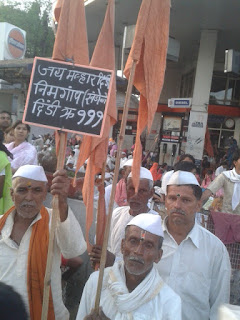Vipul Shaha
July 10, 2010
It was just another Saturday evening after
a tiring day at school. I was not much
in a mood to do any work that had piled up on my weekend to-do list. So I decided to go on a cycle ride in nearby
army cantonment area. It is one of those few places where there is much lesser
traffic, clean and well-laid roads, and lots of old beautiful trees with a
diversity of bird-life still existent.
Weekend cycle rides are for me a way of escaping from the daily routine
and regimentation. Cycling gives me an
unusual sense of freedom and control as I peddle along with no particular
destination in mind. I simply follow the
path that intuitively guides me on these rides.
I enjoy exploring new places and observing the surroundings. It allows me a chance to be completely with
myself with no deadlines to meet, no appointments to make and no plans to execute.
This Saturday evening, I was enjoying one
such cycle expedition. The monsoon
showers had covered the roadside with fresh greenery. The day’s events had turned me into a slightly
reflective mood, and so I was riding slow trying to absorb of what is going
around and inside. As I was about to
take a yet another unknown turn, I saw him—an old man with a white beard,
uncombed hair, not-so-clean clothes on.
About 20 feet distance from where I was on my bike, this man was sitting
under a deserted metal shade. He had an
empty bottle in his hand with which he was calling me towards him. As he called me, my first thought was to
start peddling faster and pretend as if I didn’t see him. I thought of him as a homeless man perhaps begging
for money. I would normally just ignore such invitations from a stranger and
carry on with my business—partly because I make myself believe that I am always
in a hurry and partly because I carry inhibitions about roadside strangers.
Today was different though. Today, I wanted to know, to get involved and
to step out of my comfort. Something
within stopped me. I found myself approaching this man with curiosity and
caution. What would he want from me? As
I went closer, he pointed the empty bottle towards me and requested for some
water. My instant reaction was—but I am
not carrying any water with me! His face
went sad with rather disbelief. As I
took a closer look at him, I realized that this man had no legs and no right
hand! He asked me to park my cycle near
where he was and directed me to the army hospital on the other side of the
street for water. The suspicious self in
me was still questioning the credibility of this man. Is he hiding his legs and hand—I asked
myself. What if he takes away my
bicycle? I locked the cycle and went to
fetch him some water…still a little nervous about what I had just seen and
gotten myself into. I wondered if this was
some plan to trick me? When I returned with the filled water bottle, he spoke
with genuine gratitude, ‘Thank you so much.
God will bless you. And sorry for
all the trouble.’ His words melted my
heart. I couldn’t help feel ashamed
about my crude thinking.
As I handed him over the bottle, he told me to carry on helping
any disabled person I may come across. I
could now see a kind and thoughtful man behind his disheveled appearance. He told his story…and I found myself
patiently listening to it. To my
surprise he spoke good English as he had graduated from the famous Fergusson
College back in the seventies—my own alma mater. A high volt electrical shock left him
crippled for life—having to lose both the legs and a hand. The man also lost all his close relatives one
by one and has no one to call family today.
None of this stopped him from having hope in life and faith in God. The metal shed where I met him is owned by
the army. He looks after it by keeping
it clean and not allowing outsiders to misuse it. He has made it his home—a good protection
from the monsoon rains. I asked him
about how he passes his time, being there all day and night with no one to look
after him. He said “When you have purity
in your heart, God takes care of you.
There are always good hearted people in this world who come and help you
if you have faith.” I bid him goodbye
with a promise to meet him again. As I
peddled back home, I wondered what, despite having literally nothing, keeps
this man going in life? The incidence
will continue to inspire me to embrace life to the fullest no matter whatever
the situation.








